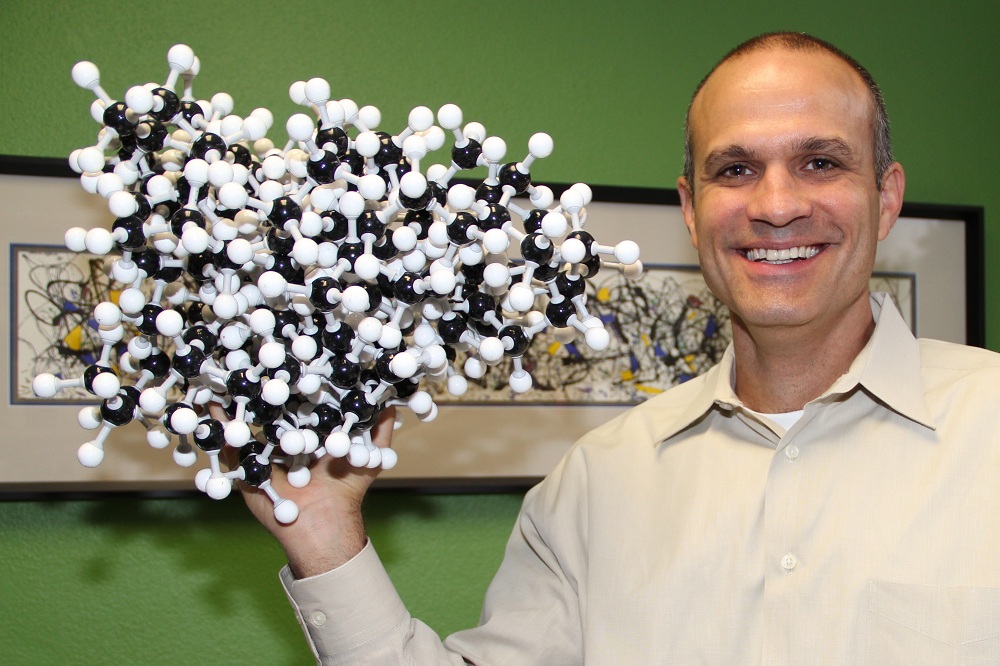Chemist Invents Environmentally Friendly Plastics of Tomorrow

This ScienceLives article was provided to LiveScience in partnership with the National Science Foundation.
Marc Hillmyer loves plastic. He is fascinated by the incredible properties that these amazing materials exhibit. They can be stronger than steel, stop a speeding bullet, convert light into electricity, protect us from harmful pathogens, and help cure disease and repair our bodies.
As a chemist, Hillmyer thinks hard about the polymer molecules that make up plastic and how to design new materials with even more advanced properties and applications. However, while plastic polymers are essential to myriad technologies we encounter every day, the production and disposal of these products presents inescapable environmental challenges that are costly to correct at a minimum and unsustainable in the long term.
In his latest mission, Marc focuses his research attention on solving the "sustainability problem" in the world of plastics by developing alternatives using renewable bulk materials like carbohydrates, plant oils and plant based organic compounds called terpenes. He envisions the plastics of tomorrow being even more remarkable from both performance and sustainability perspectives.
Marc received his B.S. degree from the University of Florida, a Ph.D. from the California Institute of Technology and became as an assistant professor at the University of Minnesota in 1997. Today he is a Distinguished McKnight University Professor and the director of the Center for Sustainable Polymers at the University of Minnesota, a Center for Chemical Innovation supported by the National Science Foundation. Read more about his initiatives in this press release from the University of Minnesota.
Name: Marc A. Hillmyer Age: 44 Institution: University of Minnesota Field of Study: Polymer Chemistry
What inspired you to choose this field of study? I chose this field primarily because of my second undergraduate research experience (my first was washing beakers!). I worked with professor Ken Wagener at the University of Florida, and he introduced me to the fascinating word of polymer chemistry by allowing me to do my own research in his laboratory. The conversion of stinky organic liquids into materials with impressive physical properties was amazing to me, and I was quickly infected with an enthusiasm for the discovery and development of new materials.
Sign up for the Live Science daily newsletter now
Get the world’s most fascinating discoveries delivered straight to your inbox.
What is the best piece of advice you ever received? I'm not sure who gave it to me, but basically the advice was something like: "Put your head down, work hard, don't give up and good things will happen." Research, hard work, attention to detail, and critical evaluation of your own work will (ultimately) lead to successes and results that have impact. I always try to keep this in mind when working on challenging problems.
What was your first scientific experiment as a child? I remember running a classic aluminum foil plus hydrochloric acid experiment to generate hydrogen — and then burning the hydrogen with my cousin in a decidedly unsafe manner. I'm not sure where we procured the acid, but it was fun!
What is your favorite thing about being a researcher? Working on hard and important problems is, of course, important to me, but I have to say that I get a thrill out of making new materials that no one has made before. Uncovering the unknown is tremendously stimulating.
What is the most important characteristic a researcher must demonstrate in order to be an effective researcher? Being thorough and complete are critical aspects to being effective. Of course, doing one more experiment can raise more questions than it answers, but making sure that you have all your "i"s dotted and "t"s crossed is important.
What are the societal benefits of your research? Our work is focused on the discovery and development of new and useful plastics that come from renewable feedstocks, degrade without harm to the environment and do not have adverse health effects. This will help build a portfolio of materials that can be generated, used and disposed of in a sustainable manner. With oil supplies dwindling, landfills expanding, and toxicity issues linked to plastics, we as a society need to explore new types of materials that can meet pressing materials needs in a wide variety of technologies without compromising our resources, environment and health. We aim to do that through fundamental, basic research in the emerging area of sustainable polymers.
Who has had the most influence on your thinking as a researcher? I would say that my three researcher advisors (Ken Wagener at the University of Florida, my Ph.D. advisor Bob Grubbs at Caltech, and my postdoctoral advisor Frank Bates, at the University of Minnesota) really shaped who I am as a researcher today. They all had very different styles and perspectives that I now try to integrate into my approach.
What about your field or being a researcher do you think would surprise people the most? The tremendous amount of time I spend on writing. It is so important to be able to effectively communicate your results to experts and non-experts alike. I spend a good fraction of my time working on the writing in publications, grant proposals and presentations. It's not all about playing in the lab!
If you could only rescue one thing from your burning office or lab, what would it be? My Jackson Pollack print "Summertime: Number 9A."
What music do you play most often in your lab or car? Jazz from the likes of Pat Metheny, Mike Stern, and The Bad Plus (with a little Coldplay here and there).
Editor's Note: The researchers depicted in ScienceLives articles have been supported by the National Science Foundation (NSF), the federal agency charged with funding basic research and education across all fields of science and engineering. Any opinions, findings, and conclusions or recommendations expressed in this material are those of the author and do not necessarily reflect the views of the National Science Foundation. See the ScienceLives archive.










